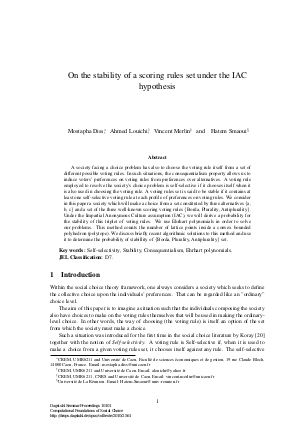On the stability of a scoring rules set under the IAC
Authors Vincent Merlin, Mostapha Diss, Ahmed Louichi, Hatem Smaoui
-
Part of:
Volume:
Dagstuhl Seminar Proceedings, Volume 10101
Part of: Series: Dagstuhl Seminar Proceedings (DagSemProc) - License:
 Creative Commons Attribution 4.0 International license
Creative Commons Attribution 4.0 International license
- Publication Date: 2010-05-20
File

PDF
DagSemProc.10101.6.pdf
- Filesize: 172 kB
- 14 pages
Document Identifiers
Subject Classification
Keywords
- Self-selectivity
- Stability
- Consequentialism
- Ehrhart polynomials
Metrics
- Access Statistics
-
Total Accesses (updated on a weekly basis)
0PDF Downloads0Metadata Views
Abstract
A society facing a choice problem has also to choose the voting rule itself from a set of different possible voting rules. In such situations, the consequentialism property allows us to induce voters' preferences on voting rules from preferences over alternatives. A voting rule employed to resolve the society's choice problem is self-selective if it chooses itself when it
is also used in choosing the voting rule. A voting rules set is said to be stable if it contains at least one self-selective voting rule at each profile of preferences on voting rules. We consider in this paper a society which will make a choice from a set constituted by three alternatives {a, b, c} and a set of the three well-known scoring voting rules {Borda, Plurality, Antiplurality}.
Under the Impartial Anonymous Culture assumption (IAC), we will derive a probability for the stability of this triplet of voting rules. We use Ehrhart polynomials in order to solve our problems. This method counts the number of lattice points inside a convex bounded polyhedron (polytope). We discuss briefly recent algorithmic solutions to this method and use
it to determine the probability of stabillity of {Borda, Plurality, Antiplurality} set.
Cite As Get BibTex
Vincent Merlin, Mostapha Diss, Ahmed Louichi, and Hatem Smaoui. On the stability of a scoring rules set under the IAC. In Computational Foundations of Social Choice. Dagstuhl Seminar Proceedings, Volume 10101, pp. 1-14, Schloss Dagstuhl – Leibniz-Zentrum für Informatik (2010)
https://doi.org/10.4230/DagSemProc.10101.6
BibTex
@InProceedings{merlin_et_al:DagSemProc.10101.6,
author = {Merlin, Vincent and Diss, Mostapha and Louichi, Ahmed and Smaoui, Hatem},
title = {{On the stability of a scoring rules set under the IAC}},
booktitle = {Computational Foundations of Social Choice},
pages = {1--14},
series = {Dagstuhl Seminar Proceedings (DagSemProc)},
ISSN = {1862-4405},
year = {2010},
volume = {10101},
editor = {Felix Brandt and Vincent Conitzer and Lane A. Hemaspaandra and Jean-Francois Laslier and William S. Zwicker},
publisher = {Schloss Dagstuhl -- Leibniz-Zentrum f{\"u}r Informatik},
address = {Dagstuhl, Germany},
URL = {https://drops.dagstuhl.de/entities/document/10.4230/DagSemProc.10101.6},
URN = {urn:nbn:de:0030-drops-25610},
doi = {10.4230/DagSemProc.10101.6},
annote = {Keywords: Self-selectivity, Stability, Consequentialism, Ehrhart polynomials}
}
